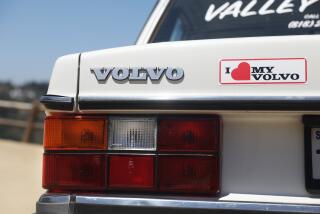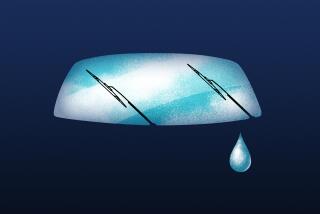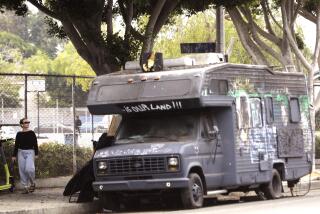Global Voices: VW van bio tracks groovy rides to the far reaches
- Share via
The call of the road, from County Cork to Katmandu, came to the tune-in, turn-on, drop-out generations from an internal combustion engine mounted at the rear of a rolling hotel room.
The Volkswagen camper van brought the idealistic and the adventurous to unexplored and little understood corners of the world, transforming world travel from an indulgence of affluent Ivy League graduates into journeys affordable for baby boomers in search of enlightenment and good karma.
In “The VW Camper Van: A Biography,” [c. 2013 Aurum Press Ltd.] British folklorist Mike Harding chronicles the history of the vehicle that put the “trip” into travel and lured millions out of their comfort zones to learn how the rest of the world lives.
Progeny of the Gypsy vardo, the pioneers’ covered wagons, the snake oil salesman’s steam-engine-drawn kiosk and the Airstream trailer, the camper van born of Adolf Hitler’s “People’s Car” and a British army major’s commitment to get the VW factory back up and running after World War II carried the curious to the far ends of the earth.
Harding cites the likes of John Muir, Henry David Thoreau, Ken Kesey and Jack Kerouac as inspiration for his biography and personifying of the vans that are usually named by their owners. Harding’s current ride is Molly, a 2001 Brazilian-made Type 2 Bay Window.
“I believe that the gentle but pervasive whiff of revolt and anarchy that I sense in the air along with the smell of camping gas and frying bacon at various Dubmeets and vanfests comes from the same spirit of rebellion and individualism that these writers celebrated,” Harding says of the humanity and nature-loving writers who came before him.
The lifelong nostalgia tour on which Harding takes readers begins with his first Vee Dub experience more than 50 years ago as a teenage traveling musician with the Manchester Rainmakers and moves on to friends’ months-long motorized treks to the Himalayas and Tierra del Fuego. The semiretired writer, who splits his time between the west of Ireland and the Yorkshire Dales, spoke with The Times about the camper van’s influence on how postwar generations see the world.
Q: Did the Volkswagen van change how young people toured the world?
Mike Harding: Yes. It was an accessible vehicle. The people I spoke to -- and I didn’t get them all in the book -- were mostly impoverished students and dropouts who clubbed together and bought one of these things and traveled to Marrakesh or Kabul. A lot of people who didn’t have rich parents to give them money to go to Switzerland for the summer were able to have this Ken Kesey or Jack Kerouac experience.
Q: Why did the camper van call so luringly to that sliver of the population that came of age in the ‘60s and ‘70s?
Harding: The original panel vans were fairly cheap to get hold of and convert into a caravan. It’s such a reliable vehicle, it didn’t cost much to run and if it did break down you could get it repaired anywhere in the world. And for the counterculture, it became a symbol of freedom, a symbol of anarchy, almost. It has also been quite popular with the surfer crowd, those who wanted to drop out of the rat race, the type who didn’t want to go back to working for The Man. It was also liked for functional reasons, that you could put your surfboard on the roof, even two or three, and you could sit at the ocean with the side doors open wide, looking out and ready straight on to catch the big ones.
Q: You mention in the book the cultural clash between the generation that embraced the camper van and vagabond travel as part of listening to a different beat and the coinciding segment of the postwar population that was more materialistic. Do you still see that divide in society today or did one side or the other prevail?
Harding: Unfortunately, we’ve gone back into the desolation of full-run capitalism, which is just destroying all that was simple and easy. After World War II, there was a feeling in the West that if you worked hard and educated your kids, that they would ultimately end up in a better social position than the parents. This country [Britain] was on its knees in 1945, yet it developed a free health system and other rights and protections. But it’s all being taken back in the name of capitalism. Consistently since 1945, there’s been a chipping away of the rights people managed to gather for themselves after the war.
Q: Don’t the Occupy movements we’ve seen in the past few years reflect a spirit similar to the Beat generation and the hippies of 40-50 years ago?
Harding: There’s a different edge to it now. We had the 1968 student riots in Paris and the sit-ins and the anti-nuclear stuff going on back then. They were specific issues being protested then. Now a whole mess of confusion has resulted from unbridled capitalism running riot for the last 30 years. We’re not really sure what direction this can take. The occupying events produce massive support but then get diffused, to some extent by Facebook and Twitter. We can shout all we want in postings, but I don’t think anything happens until people start smashing up cities. Only when the revolution starts getting close to the ruling classes and their safety zones does anything change. The same 1% is running the country now as in 1920.
Q: In the book, you follow a young man named Chris on a drive to Yugoslavia and the Mediterranean that cost a group of friends less than 100 pounds [$150] each for a four-week vacation. Was that part of the attraction, that the VW van exuded economy and efficiency that befit environmentally conscious wanderings?
Harding: This mode of transportation benefits travelers more than tourists, for the person who wants to go walking in the west of Ireland or climbing in the Himalayas. You have to make a distinction between the traveler and the tourist. A tourist wants to replicate what he has back home -- the same food, a comfortable bed, to go out and see the sights but come back to the usual comforts. The traveler is more prepared to sleep on the floor, wait hours for a bus, eat local food and buy local clothes to wear on the road. Travelers took to the VW camper for those reasons.
Q: Restored VW camper vans are now all the rage among travelers into “retro” gear and experiences. How long can that last, given that cars don’t last forever, at least not in a state where they can be depended on to take you to Katmandu?
Harding: In this country, people are actually making panels and every other part you need for a VW to be like brand-new. It’s like the story of the knife -- you replace the blade and then you replace the handle but it’s still the same knife. I talk in the book about the people who make their living driving around to camper jams and DubFests to sell their parts and services. And people keep discovering old VW vans hidden away in barns and garages.
Q: The book is a fun nostalgia tour, but is there a future for the VW camper van? Does Volkswagen still make them, and are they still affordable for budget-minded adventurers?
Harding: They’re still making them but they are very expensive, high-end touring camper vans now. Production has gone over to Brazil, but I think they’re coming to an end, too, which is very sad. There are stronger emissions control standards in the United States and Europe now and the engines can’t be modified to fit in. But they will be around for a while. People who have them tend to keep them around for 50 years. I just saw a Samba 23-window bus advertised in mint condition but for 99,000 pounds [$147,000]. All you could do with that is put it in the garage up on bricks and take it out for shows. I don’t see any point in that.
More to Read
Sign up for Essential California
The most important California stories and recommendations in your inbox every morning.
You may occasionally receive promotional content from the Los Angeles Times.











